Government ‘exaggerated terror threat’
Australia’s spies are welcoming the Government’s push to introduce tough new laws to tackle home-grown terrorists, but civil liberty groups say the likelihood of attacks is being exaggerated.
Senior intelligence officials have told the ABC’s AM that they fear fighting in Syria and Iraq could revive the anti-Western extremism in Indonesia that led to the Bali bombings.
They expect the threat of Islamist terrorism globally to increase.
Liberal MP Dan Tehan, head of the Federal Parliament’s Intelligence and Security Committee which is examining proposed changes to national security laws, says spy agencies have deep fears history will repeat itself.
“We are potentially facing one of the biggest threats we’ve faced in the past 20 to 30 years,” Mr Tehan said.
“If you look at Afghanistan where there were 30 Australians involved in fighting there, 25 returned. And of those 25, 19 were suspected of being involved in terrorist-related activities and eight were actually convicted.
“Given that we know we’ve now got 60 fighting in Iraq and Syria and 150 who are involved in one way or another, this is extremely concerning.”
Intelligence sources told AM the terrorism threat is likely to increase for Australians at home and abroad over the next five years.
To combat it they say they need the powers the Government announced yesterday, which will give them the right to suspend passports, make it easier to crack down on those suspected of a terrorist plot, broaden the criteria for banning a terrorist organisation, and make it a crime to go to some of the world’s trouble spots unless there is a legitimate reason.
Shadow attorney-general Mark Dreyfus told Lateline he wants the Government to better explain the proposed changes.
“Well that’s something that rings alarm bells because what the Prime Minister spoke of was a reverse onus provision,” he said.
Acting Greens leader Adam Bandt also has some concerns.
“It does look like an over-reach and especially when the Government says that all parliamentarians need to sign up to this before they’ve even seen the detail,” he said.
Security agencies, including the Australian Federal Police, ASIO, ASIS and Customs and Border Protection, will share an additional $630 million over the next four years to boost their operations.
But it is the plan to follow the digital footsteps of potential terrorists by forcing telecommunication and internet companies to keep details of call, text, internet browsing and email data for two years that has particularly upset civil liberty advocates.
Intelligence sources insist they do not want access to the content of messages or calls and are only trying to maintain the powers they currently have.
Australian Council of Civil Liberties president Terry O’Gorman likened it to being able to see the front of a envelope.
“Trying to draw a comparison between yesteryear and we want to see what’s on the envelope and where the letter was sent is totally misleading,” he said.
Mr O’Gorman believes the terrorism threat is being overstated.
“It’s all very well for the Attorney-General and Prime Minister to say, ‘oh, we’re not automatically listening to what you say on the phone’, but experts in metadata say the greater amount of metadata you collect the greater amount of privacy intrusion that occurs,” he said.
“Our concern is that this is a crisis that’s being confected that really isn’t a crisis.”
The new measures will be included in the Terrorism Foreign Fighter Bill which is slated to be introduced to Parliament when it resumes later this month.








